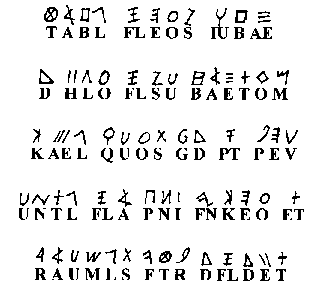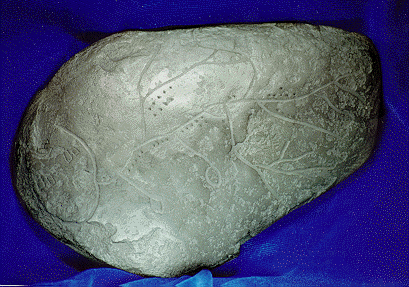

The Baetis River Stone
by Paul Schaffranke

T A B L - - FL E O S - IU B AE - - - - - - - -- Ancient Schaff
TABuLa - -FLEOS - - -IUBAE - - - - - - - - - Latin
Map - - - - - Rivers - -- -Juba (of) - - - - - -- - -English
D - - H L O - FL S U - -B A E T O M - - - - - Script
De - HeLiO - FLuSU - - BAETOM- - - - - - - Latin
By - Helios - --River - - - - Baetom - - - - - - - -English
K AE L - Q U O S - -G D - - PT - -P E V - - -Script
CAELi - - QUOS - - GaDe -PoTo -PErV- - - Latin
Carved - - Which - - Gades -Power- -Navi- - - English
on stone - - - - - - - -- - - - - - --ful
U N T L -FL A - - P N I - FN K E O - -ET - - Script
UNeTL -FiLiA - -PuNI - -FiNiKEO - -ET - - Latin
-gated - -branch - Punic - Phoenician -and - -English
R A U M L S - -F T R - - - D FL D E T - - - - Script
-RAUMiLiS - eFFeToR - DeFLuDEeT - -- - Latin
- - Romans - - -crushed - - they vanished - - -English
Translated as: Juba's map of rivers by Helios. Inscribed on this stone is the Baetis River upon which the powerful Punic branch of the Phoenicians from Gades navigated and vanished after they were crushed by the Romans.
This tablet is written in boustrofedon, from left to right and right to left. This tablet is deciphered on Tomb Tape IV as well as Tomb Tape III, which features the complete history and details of this inscription and map on the reverse side.
